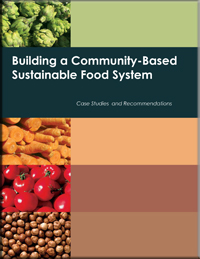Building Community-based, Sustainable Food Systems: Case Studies and Recommendations
Date & time
Apr 30, 2009,
5:00-6:30 pm EDT
Location

Something is wrong with the design of our food system. Consider the following facts:
- Shrinking profit margins for American farmers
- 6 million acres of farmland lost to development between 1992 and 1997
- Food traveling 1500 miles on average before sale
- 10 calories of fossil fuel required for every calorie of food energy
- 19% of greenhouse gas emissions from the food sector
- A majority of Americans overweight and one quarter obese
- 96 billion lbs of food grown in the US lost before consumption in 1995.
The students include Rachel Arndt, Rebecca Cheney, Jaimie Cohen, Allison Craddock, Stephanie Etkin, Caitlin Greeley, Brendan Moriarty, Nicholas Posavetz and Catherine Sanders. The faculty advisors are Larissa Larsen and Eric Dueweke.